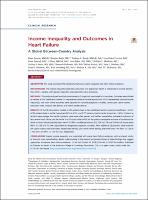| dc.description.abstract | OBJECTIVES This study examined the relationship between income inequality and heart failure outcomes. BACKGROUND The income inequality hypothesis postulates that population health is influenced by income distribution within a society, with greater inequality associated with worse outcomes. METHODS This study analyzed heart failure outcomes in 2 large trials conducted in 54 countries. Countries were divided by tertiles of Gini coefficients (where 0% represented absolute income equality and 100% represented absolute income inequality), and heart failure outcomes were adjusted for standard prognostic variables, country per capita income, education index, hospital bed density, and health worker density. RESULTS Of the 15,126 patients studied, 5,320 patients lived in Gini coefficient tertile 1 countries (coefficient: <33%), 6,124 patients lived in tertile 2 countries (33% to 41%), and 3,772 patients lived in tertile 3 countries (>41%). Patients in tertile 3 were younger than tertile 1 patients, were more often women, and had less comorbidity and several indicators of less severe heart failure, yet the tertile 3-to-1 hazard ratios (HRs) for the primary composite outcome of cardiovascular death or heart failure hospitalization were 1.57 (95% confidence interval [CI]: 1.38 to 1.79) and 1.48 for all-cause death (95% CI: 1.29 to 1.71) after adjustment for recognized prognostic variables. After additional adjustments were made for per capita income, education index, hospital bed density, and health worker density, these HRs were 1.46 (95% CI: 1.25 to 1.70) and 1.30 (95% CI: 1.10 to 1.53), respectively. CONCLUSIONS Greater income inequality was associated with worse heart failure outcomes, with an impact similar to those of major comorbidities. Better understanding of the societal and personal bases of these findings may suggest approaches to improve heart failure outcomes. (J Am Coll Cardiol HF 2019;7:336–46) © 2019 The Authors. Published by Elsevier on behalf of the American College of Cardiology Foundation. This is an open access article under the CC BY-NC-ND license (http://creativecommons.org/licenses/by-nc-nd/4.0/). | |

